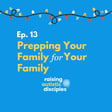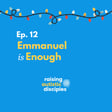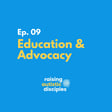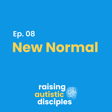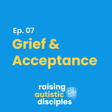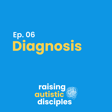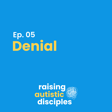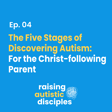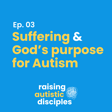Become a Creator today!Start creating today - Share your story with the world!
Start for free
00:00:00
00:00:01

Why is Life so Hard?
Join Collin and Larah as they discuss the question "why does life have to be so hard?" Why is the journey of raising an autistic kid have its challenges?
What verse in the Bible explains "why is this life so hard?"
Join the conversation!
Transcript
Welcome to Raising Autistic Disciples 2025
00:00:02
Speaker
Hello and welcome to the first episode of Raising Autistic Disciples for the year 2025. Yes, looky there.
Health Challenges: Colin's Journey
00:00:11
Speaker
Looky there. And just so you know, as we've listened to previous episodes, Colin still has a little bit of walking pneumonia and is still coughing up the lungs. So... I think people understand. You know, we
20 Years of Friendship and Marriage Joy
00:00:25
Speaker
just... We met each other in the year 2006. Oh, we did.
00:00:30
Speaker
We were approaching 20 years of knowing each other. 20 years of knowing each other. Yeah, 19 years this year. Wow. Look at there. The war is good. Good. I think I've told you this before, and I tell other people, like, how do you, like, what's your favorite thing about marriage in general? Like, it usually comes up whenever you're talking to somebody who's engaged or about to be married. Like, what's your favorite thing about it? I was like, when I wake up in the morning, Hilara's still there.
00:01:02
Speaker
Praise God. The grace of God on you. I'd say that'd start every day with the realization, oh yes, she didn't leave. And I begin every day with the realization that if you left,
00:01:17
Speaker
Which is why, as those of you have heard me tell, you know, Colin's whole, ah back in March, 2020, what were we all
Facing a Health Scare
00:01:25
Speaker
doing? We were all hunkering down because of COVID. Well, Colin decides to grow a massive lump in his neck and has to have surgery to remove without anything it. just You're right. The doctor actually said it was from birth anyway. And so this massive lump in your neck, you have to immediately, you know, we have to go ear, nose, and throat. You come out. I remember it like it was yesterday. Why does a sheet, because I'm naive thinking, oh, they're going to go. They're going to drain it. It's going to run. You know, sorry if it's TMI and growth. But ah anyway, you walk out to the car, you get in the front seat, you look at me and say, they don't know what it is. They think it's cancer. My world falls apart.
00:01:57
Speaker
I cry for three weeks straight because that was the time between, you know, them saying that and the surgery. And you literally will not like, I asked you every single night after we put the kids to bed and I'm grateful for this, but it also was very annoying at the time. Uh, I ask you, is everything going to be all right? Just tell me everything's going to be all right. And your answer every single time was no matter what, it's going to be okay. Either way. No, you either way. either way it's gonna be okay. Drove me absoluteness. Because I know that the Lord in marriage has put you to be the shepherd and the spiritual leader of our home. But it was quite annoying when I thought, you know what, he could, this could be cancer and, you know, God forbid, whatever. And I could be single parenting, three kids, one on the spectrum,
Faith and Support for Single Parents
00:02:44
Speaker
yada yada. He'd be sufficient for that moment just as much as he is right now. And he would. But your whole answer of, you know, either way it'd be okay.
00:02:52
Speaker
was I knew it, I knew it was the right answer. But during that time, okay, anyway, so that, that brings us to the point, a little short story, a little backstory of our lives to the whole like. Yeah, the best part about marriage is that I don't have to do it ballistic. Because if I had to do this by myself, which, the again, the Lord was sustained, and those of you who are listening who are single parenting, please know we are praying for you. And we see you. We see you. I was raised by a single mom. God is good. um Hey, keep going. Do not give up. um Get in community. Get in a church.
00:03:33
Speaker
you know, have people around you that can support you. But and anyway, Paul wrote to Timothy, remain at Ephesus, be content where you are and remain that's it and he's going to sustain you. That's it. Okay. So that was a little bit of backstory about. That's a good segue into our time. It was a good segue. So I thought it was good. I was hoping you would say like, Oh man, man, what a good segue. Yeah. Anyway, I'll say it to myself. Hey man, good segue. goodwayway Give yourself yourself a high, there's the high five. All right. Um,
Q&A: Raising Autistic Children and Faith
00:04:01
Speaker
okay. So Colin, I would say there are like five top questions I get regularly, um, on Instagram.
00:04:11
Speaker
From parents and from moms and dads um and And in conversations too, and I think this is not just an autism parenting thing I think this kind of spans along any disability and just looking out in our world and the the evil that yeah, that's that's coming but We were specifically going to talk about this manifestation of it. Correct. And parenting autistic kids. Like the question that comes up a lot is just why why does it have to be so hard? Yeah. And I think the, and i don't get me wrong, I've asked it too, right? Absolutely. And so, ah but the heart from it is not, is not coming from a,
00:04:47
Speaker
escapist kind of point of view. Escapist or even complaining. Right, right, yeah. It's coming from a, help me understand and think biblically about autism and about suffering.
Theology of Suffering for Parents
00:04:57
Speaker
It's a theology of suffering question. It is, don't represent, yes. And so, I've said multiple times, like, if you were to ask me what are the first things to tell a Christian parent who just got a child's autism diagnosis, I say, you've got to know what you believe about God. who He is. You've got to have a theology of suffering, and if you haven't already, you will come to know the role of the Holy Spirit really quickly. So those three things. So we're going to kind of zone in, zoom in on this theology of suffering. When we say theology, we just mean, what's your belief? As we study who God is, what is a belief that is solidified, that is rooted and cemented in how we see and put on our gospel lens of how we see the suffering that's happening? And
00:05:39
Speaker
it I'm probably not the best person to enter into these conversations with, which is why I'm glad I'm talking to you. But like when i do big when I do carry that conversation with these parents and these sisters who are asking me that question,
00:05:54
Speaker
You know, a pastor once said that was very helpful for me in terms of thinking biblically about certain issues like this. We must take the text of the Bible and overlay it on the context of the world that we live in. Yes, I understand.
00:06:09
Speaker
So we take the... And that's what I say in controversy too. like When you're having a you know a conflict with somebody and and you're like, what do I do? You take the gospel in one hand and you take the controversy in the in the conflict, how does this line like... How do we get to resolution and reconciliation? Anyway, so the the the god the Bible and God's Word is everything we need to navigate everything. That's right, yes. And so even though it doesn't say the word autism, all that kind of clarification, but it does give us everything we need to for life and godliness. For life and godliness, yeah.
00:06:38
Speaker
So we take the text of the Bible overlay it on the context of the world that we live in. Okay, so how do we think biblically in terms of a theology of suffering when it comes to autism? Yeah, let me hear your Bible real quick. And I want to be careful. See, I've gotten a little bit of pushback on this, and I and i tend to agree that suffering is a weighty word when it comes to, like, we're not in the unreached people group of West Africa that, or, or or you know, under Islam's rule where we're getting persecuted daily for being a Christian. right that's That's suffering. Right. It is a form of suffering, for sure. Right. So, I want to be careful, or maybe we could talk that through of, like, when we say a theology is suffering in terms of autism, what we're really saying is because our life is hard,
00:07:31
Speaker
Like we are navigating and managing that terrain because it's, it's tough. It is. Yeah. So, and if, if you don't, if you don't, ah we don't have to, well, how to say this, I don't think I've said this section of words. We haven't talked about this before in this way that I'm about to say it. So meaning it it can be an open, obviously an open dialogue. Cause I think this is,
00:07:57
Speaker
you're not going to you're not goingnna nail this down. like This is just a... But I think I'm ah about to read out of 2 Corinthians 1, and I think the way the Lord puts this, through Paul, inspiration of the Spirit, the part of the reason why it's in this passage of Scripture is because because if we if you see suffering just through your own your own set of circumstances,
00:08:22
Speaker
then it gets really narrow and then you can get really self centered when it comes around, like what you're going through.
Suffering as a Gospel Opportunity
00:08:29
Speaker
But if we saw suffering as opportunities for gospel advancement, no matter what its manifestation is. So whether it's cancer, whether it's, you know, persecution in the, in the, the Bush of Africa or some and Indonesia and they know places where the gospel is advancing. Our suffering is not ever intended to be, um,
00:08:54
Speaker
without gospel advancement opportunity. So it's a quote I heard a long time ago, there's no stray bullets. John Piper said it in ah in a sermon. So if you if you think about that sentence real quick, just pause and just think there's no stray bullets, no matter what happens, who then it doesn't mean that that you're guided into suffering just for your own suffering sake.
00:09:18
Speaker
but that God is sovereignly in control. All right, so let me, again i is it okay if I read this real quick? It says, 2 Corinthians chapter one, it says, bless be the God and Father of our Lord Jesus Christ, the Father of mercies, and the God of all what? Comfort. Comfort, yeah. He comforts us in our affliction, all our affliction, so that we may be able to comfort those who are in any kind of affliction through the comfort we ah ourselves receive from God.
00:09:45
Speaker
For just as the sufferings of Christ overflowed us so also through Christ, our comfort overflows. If we are afflicted, it is for your comfort and salvation." That's big. That's chapter, that's verse six. If we are comforted, it is for your comfort, which produces in you patient endurance of the same sufferings that we suffer. In our hope for you as firm, this is Paul talking to the Corinthians.
00:10:11
Speaker
because we know that as you share in the sufferings, so you will also share in the comfort. So yeah when I, so let's ah yeah ah use cancer, for example, so that is a, that is a form of common suffering that we all have access like you're exposed to. If you just think about a cancer diagnosis real quick and we'll overlay this, what we're talking about is the, the second that a cancer diagnosis is given, you're in a room with who?
00:10:41
Speaker
doctors, doctors, nurses in the future. If it involves chemo, if it involves other thing, who else are you in the room with? Other cancer. And they're all watching you do what suffer well, suffer well. And at any point in time, like if, if the Lord gives you, because this body is not, this is not all there is. This world is not our home. If you're a believer and you believe that, then the souls of the people that you're interacting with,
00:11:09
Speaker
as you are comforted by the Lord, and you extend that comfort to other people, they see it. That's right. Right? Yeah. As in 1 Peter, like like demonstrate to the Gentiles the hope that is in you. So we suffer well, meaning that we're not overcome by the circumstances of this world.
00:11:30
Speaker
if you see the opportunity for suffering for gospel advancement, it's going to put you in rooms with people that you would never be with otherwise. That's right. We talk about that and how to advocate and stay Christian, like the other the the person on the other side of the table or beside me in the waiting room or where so or at this the splash pad or whatever, their great I have their greatest need. And it's not that you're just hoping against hope and like, oh, this isn't that bad. Right. It's bad. It's hard. Right.
00:11:55
Speaker
But even in the midst of it, I have the greatest thing. Yeah. I mean, and then Jesus Christ. Yes. And as he comforts like that verse six is always, it gets me. Cause verses three, four, and five is our theology of suffering. Yeah. Cause he is the God of all comfort. We share in the afflictions, we share in the sufferings of Christ, but if we are afflicted,
00:12:17
Speaker
it is for your comfort and salvation. So you're talking about the apostles talking to the Corinthians, right? So the apostles are afflicted. It's because they're fighting on behalf of ah the first century church. So even if you extend that to just suffering in general, if a suffering or affliction is brought into your life, it is it is intentionally for the Christian meant for someone else's comfort and salvation. So i ah bring that to autism. Yeah, so autism is the same thing. Like you've been given a... Sorry, go ahead. First off, do we believe God gave us an autistic child? Yes.
Rejecting Insufficient Faith Narratives
00:12:55
Speaker
Okay. Yeah. Keep going. Now, I know that probably has a lot of <unk> a lot of different
00:13:01
Speaker
For different people that may stumble upon this and listen, we've we've already partially, if not fully, offended a whole group of people that believe the only reason our kid has autism is because we don't pray enough. We don't have enough faith, right? Now, I wholeheartedly reject that. I couldn't ah couldn't begin to describe how much I reject that theology, because I think it's i think it's damaging, and I think it's it's completely against this passage of Scripture.
00:13:27
Speaker
it does not mean that we shouldn't pray. It just means that our prayers should be gospel advancing focus, not just trying to alleviate our circumstances. So if God removes autism from my child and He wants to for His glory and for our good, great. But even if He doesn't, it's still for His glory and our good. It doesn't change. So anyway, that's a soapbox. We'll go on it for a minute.
00:13:52
Speaker
So even when you're, if you imagine what we're talking about as a, in the realm of like autism diagnosis, I mean, if you just sat down and wrote out all the people, all the rooms, all the places that you are probably in that you never would have been otherwise. Yeah.
00:14:14
Speaker
then if you put the lens on it is that if God gave you this child, this person, whoever you're caretaking for, and it was for the only express purpose is that you're gonna sit in a room with a teacher. I'm gonna say names and I'm not allowed to say that, but you sat in a room with your child's teacher, who was not a believer.
00:14:38
Speaker
And through an IEP meeting, you're allowed to just, you just, they could just see the hope that's in you. You weren't overcome by this. You're working as a team. yeah They're not the enemy. I mean, like all the things that you wouldn't, you would normally would be the characteristics of your advocacy. Yeah.
00:14:57
Speaker
and you're able to share the Bible, share your hope. Why are you like this? If the if the entire hope is that maybe one teacher out of all the ones that you ever encounter, come to know Christ and we'll be with us in eternity. Is autism worth it? Amen. Totally worth it. because okay But I say totally worth it. yeah and And what we're about...
00:15:17
Speaker
what we're about to say, we are totally in this same journey with the parent that's listening. So please don't, but here's what I have discovered, and I'm gonna try not to be, I'm gonna try not to be harsh, I'm gonna try not to be. Or dismissive. Or dismissive. But you have to be reading your Bible. Yes, absolutely. Because here's the thing, if you're not, if you have not been overcome by the gospel, then you don't understand why the person that's not giving you your kid service is not the enemy. That's right, yes.
00:15:47
Speaker
you you will then begin, the enemy will begin to plant thoughts in your head that youre that they are against you. Here's what is so important, friend. We have to see past our heart. We have to see past the autism challenges and and those that we come up against or whatever, you know what I'm saying, like those who are not listening or we don't feel heard and and things like that. What we have to do is put gospel lenses on and understand the the reality
00:16:19
Speaker
yeah of where' where they'll spend eternity. Yes, absolutely. So if we're not if we have not ourselves been overcome by the gospel and what has been done through us through Jesus' life, death, and resurrection and how He has saved me yeah from my sin so that I will live forever yeah in God's presence, where God's presence is where we're where we're supposed to be right now, right, under His ah presence, protection, peace, and provision, one well will be there one day, but they won't. That's right, yes.
00:16:49
Speaker
if we do not handle the autism diagnosis of the people that he's put in our path to show them that we we will we all do this well, we will not do this like the rest of the world. that's right so that Because here's what's happening. I think in that question of why is it so hard,
00:17:07
Speaker
ah No, no, no. ah Why does it have to be so hard? We have to understand what is happening. Yes, right. Yes. That's
Extending Grace Through Challenges
00:17:13
Speaker
the point. Yeah. Okay. That's where we're starting. That's where we're starting. If you don't, this isn't alleviate the hard because it is correct. And I think when you reiterate it again, this is not like a hoping against hope, like, eh, it's just, it's just the world. That'd be fine. Whatever. It's not, ah it's not that like you're, no, something is happening. It's happening and it's hard. Yeah. Like there's, because this, this passage,
00:17:35
Speaker
if you overlay it with Paul's understanding of the Bible and the or the Old Testament, like all the stuff that he grew up as a good Jewish man, right? He understood the Old Testament. So this is an outflow of all of that. He's in the first century church and the spirit moving in that church and and planting it. He understood the moments where God was the comfort to the Israelites in the wilderness. He was their comfort and salvation. Right.
00:18:03
Speaker
but they came across all of these Gentiles yeah that they ignored, right? And then when you come to parables about like the Good Samaritan and all these other things where and the Israelites were still comforted and given you know salvation, but just don't miss your opportunities when you're in that moment, even when it's hard. Like you said, look like look through it, put the right lenses on. This is hard, but why am I here?
00:18:28
Speaker
And it's because He's going to comfort you. He's going to demonstrate to you that He's present. Yeah. I'll give you i'll give you a great example. And to some of us, we have been we have been raised to not be rude.
00:18:43
Speaker
But I will tell you, there's even bold statements that if you can ask the Lord for help, don't come across rude. Let me give you an example. So when Graham has a meltdown in public, now again, back to, yeah I've had to train myself to do this. This does not come easy. But then the onlooker, somebody passes, says, I mean, that kid just needs a good spanking or or you know just says something. and I have to think of my head, too. Well, they were bold in saying it. It's kind of like social media. Well, you commented first. Why? like yeah You said something, you know. Anyway, so bold statement. And you know, even in those times where i there's two choices, I could come back with, well, I'm sure you have stuff in your, you know, I'm sure you, whatever. And you're notorious for your your happy texting fingers. Oh, yeah, I text. Yeah, that's not a short.
00:19:32
Speaker
But I'm saying like in Walmart when Graham has a meltdown in the onlooker or the, I hate to say it because I don't mean to be stereotypical, but the older generation yeah yeah says he just needs a good spanking or whatever. yeah I have two choices. I can either come back with a rude comment or I can come out with a bold comment that is in humility. Meaning I can come back and say, well, I'm so glad that grace was extended on me. Yes, absolutely.
00:19:58
Speaker
That's not out of bounds, friends. Like, that helps that onlooker. yeah If they're a believer, hopefully they'll go back to their car and be like, you know what, that was so right, God forgive me. yeah But if they're not a believer, at least you offered some gospel... Yes. ...redirection. That's right, yes.
00:20:14
Speaker
So don't be afraid to, you know, I mean, sometimes the Holy Spirit is why the whole role of the Holy Spirit is so important. We'll tell you, shut your mouth. Other times offer in humility a a statement that turns the situation around so that person can know, you know what, my comment was out of bounds, but also they were responded in kindness. yeah But yet with a zinger. That's right, yeah. You know? Well, that's the, we just, we just left by the time this episode airs, we just left the Christmas season, right?
00:20:43
Speaker
But like that that's why the incarnation is so important and one of the birth of Christ is so important for our Christian rhythm. He says, what does it say in John 14? When the Word became flesh, He came in grace in what? Truth. So like He didn't come in just truth, which He could have delivered harshly and say, hey, listen, here's the truth and you obviously aren't doing it. I'm gonna annihilate everyone, and which He'd be within as right as God of the universe to do.
00:21:09
Speaker
But He came in grace and truth. He came in humility. So He is extending that through us in all those situations. Right. So meaning that right now we're just talking about you're your internal theology of suffering.
Biblical Insights on Suffering
00:21:23
Speaker
We haven't talked about your child and the other circumstances yet. where I'm sure we're going to get to that that hard. That's a whole hard thing.
00:21:30
Speaker
But in this case, as we wrap up this particular section, this is just helping you frame a theology around why this is hard. Right. And just to end with this point, there is one verse in Scripture that helps us connect a theology of suffering. if it had a been If it had been left out, we would not be able to understand the rest of the Bible. Absolutely. And that verse is Genesis 3.15. Absolutely, yes. you know so So disobedience entered the garden, right? Ammonie sinned, death and toll is now a reality, right? God in his kindness says, I will send one who will crush the head of the serpent forever. But he says in Genesis 3.15, I will put host hostility. Between you. Between you and the woman, right? So friends, that one verse tells us, so our question being, why is this so hard? That verse tells us the why.
00:22:21
Speaker
Yes. It's because now we are living on the other side of this this ah the other side of eternity, this reality where there is hostility, there is pain, there is suffering. Suffering will be the mark of every Christian. That's what Paul is is trying to get to the Church of Corinth. Like, yeah you will be marked by your suffering and if you do it well, it will be used for God's glory and you're good, yeah right? So Genesis 3 helps us solidify our understanding of theology of suffering because we know this is what's happening. that's right And until Christ returns, until God says, go get my kids, um and and and Jesus comes to earth, makes all things new, again, we are living in that in-between of there's hostility, there's evil, there's suffering. there's there's I've explained this before. Autism, it's just we can't just make sense of it. Right. Yes. Yeah. Right. So that's right. So it doesn't, it's not because of sin. It's not sin. It's because on this side of attorney and in that Genesis three 15 marker, we now can't make sense of some things. That's right. Yes. Because we don't, we are not, you know, yeah fully whole. Absolutely. That's good. Yeah. Absolutely. I mean, it's, um, yeah, I mean, just letting that truth land is, is
00:23:41
Speaker
is paramount. yeah Because if you if you live outside of it, then none of it's going to make any sense. This is what the beautiful thing is about scripture. and is that When you come to Ephesians chapter two, listen to these words, because you just read it, right? That was Genesis 3.15. This is towards the end of the book, right? It says, Ephesians 2.14, for he is our peace. He made both groups one and tore down the dividing wall of what? Hostility. Hostility.
00:24:10
Speaker
And in his flesh he made of no effect the law consisting of commands and expressed in regulation. So they might create himself one new man from the two resulting in peace. And see and he did this to reconcile both to himself. So like the the reason for the hard is because obviously the Lord has given you a person in your child or in whoever you're caregiving for that in the world that you live in is is hard.
00:24:36
Speaker
Right. It's the world is created for neurotypical people and you've been given a neurodiverse child or someone to care, give for that. He's given you to steward and he's not unkind and he's not unjust. He's given it to you because not only is he faithful to sustain you through it, but there's people that you're going to encounter.
00:24:56
Speaker
that the gospel would clear through



